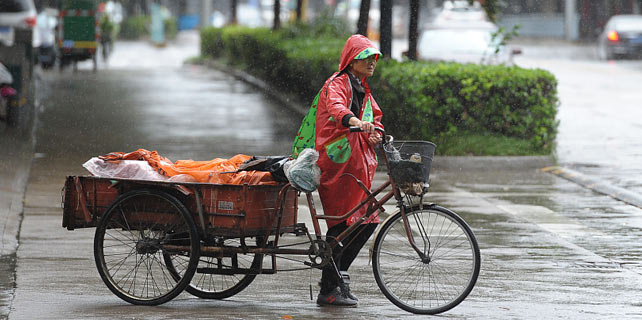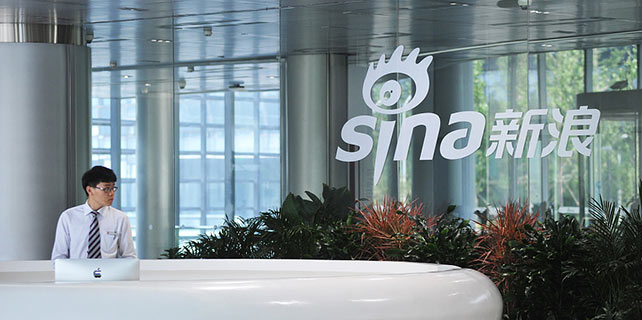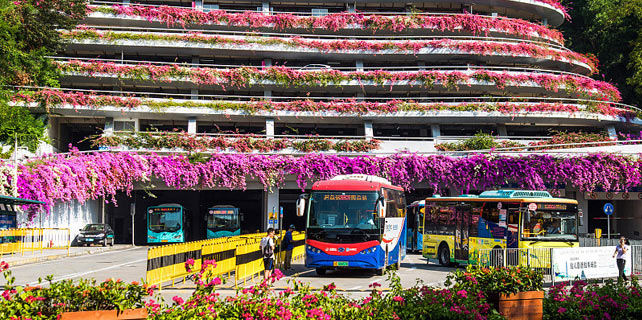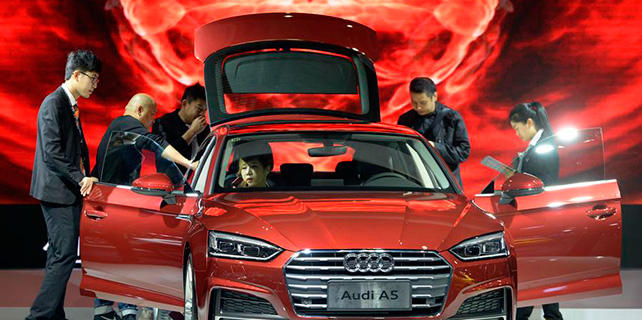Arkansas' Asa Hutchinson going to China - again
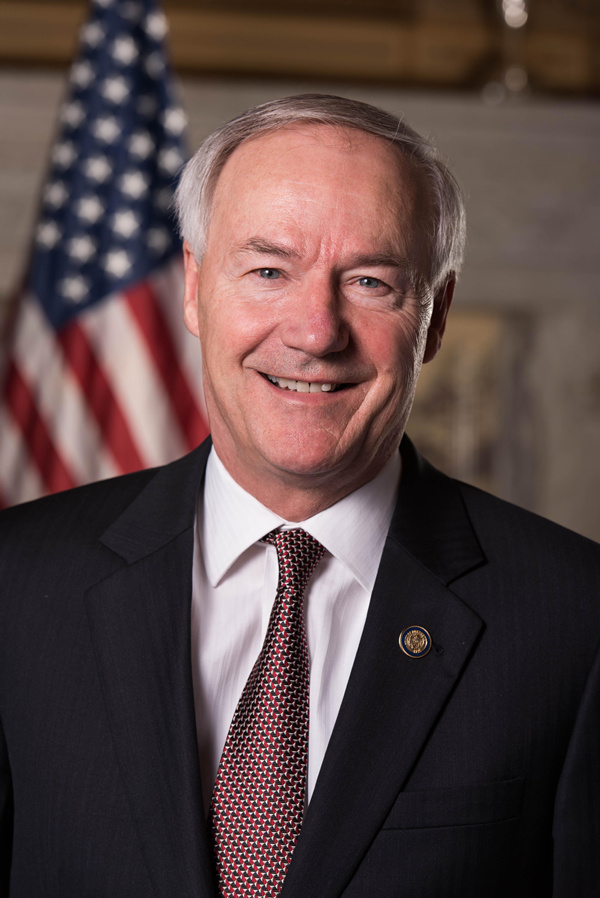
GOVERNOR ASA HUTCHINSON
46th governor of Arkansas, serving since Jan 13, 2015
Age: 66
Education: Bachelor's degree from Bob Jones University in South Carolina in 1972, and J.D. from the University of Arkansas School of Law in 1975
Honors: Appointed by President Ronald Reagan in 1982 as US attorney for the United States Western District of Arkansas, then the youngest US attorney in the nation; appointed administrator of the Drug Enforcement Administration (DEA) in 2001; tapped by President George W. Bush to lead the Border and Transportation Security Directorate, the largest division of the Department of Homeland Security, in 2003.
Political party: Republican
Marital status: Married Susan Burrell in 1973; has four children and six grandchildren
Hobbies: Reading inspirational stories, playing basketball, travel
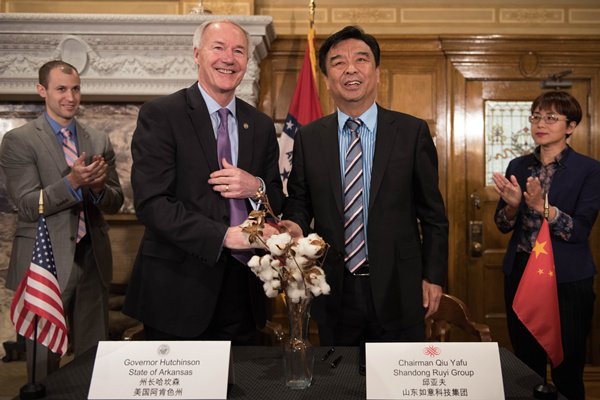 |
|
Governor Asa Hutchinson shakes hands with Chairman Yafu Qiu of Shandong Ruyi Technology Group (Ruyi) on May 10, as the company announced that it will invest $410 million in the former Sanyo manufacturing facility in Forrest City. Ruyi, headquartered in Shandong province, China, will create up to 800 jobs at the facility, the largest single job-creation announcement in the history of Arkansas' Delta Region. The plant will spin Arkansas cotton into yarn for textile use. It is Ruyi's first facility to locate in North America. Provided to China Daily |
Arkansas Governor Asa Hutchinson will seek more investments from China when he makes his third visit to the country in the coming weeks. In an in-depth interview with China Daily, he talked about what he hopes to accomplish on the trip, investments by Chinese companies in his state and how he wants to strengthen relations with China.
Since taking office in 2015, you have visited China twice. You are going to make a third visit later this year. What did you achieve in the previous two visits, and what are you going to do in the coming visit?
Over the last two years, four Chinese companies have announced plans to locate new facilities in Arkansas. These companies will create a total of 1,520 new jobs while investing $1.4 billion in the state.
Shandong Ruyi Technology Group (Ruyi), recently announced the company will invest $410 million in the former Sanyo manufacturing facility in Forrest City. This is Ruyi's first facility in North America. The 800 jobs being created by Ruyi is the largest single job-creation announcement in the history of Arkansas' Delta Region.
Tianyuan Garments Company announced 400 jobs and a $20 million investment in a new Little Rock facility. I initially announced this project during my economic mission to China in October 2016.
China-based Pet Won Pet Products recently announced it is locating a new facility in Danville to develop pet treats. The company will create 70 new jobs and invest $5 million in the building prior to the start of production.
Finally, in April 2016, Sun Paper officially announced plans to build a $1 billion bio-products mill and create 250 new jobs, which makes it one of the largest private industrial investments in the state's history.
In my upcoming visit, I intend to meet with companies and Chinese government officials interested in doing business in Arkansas.
How do you describe the current economic cooperation, trade and Chinese investment between Arkansas and China?
Arkansas' exports to China totaled $202 million in 2015, ranking China as the state's sixth largest destination. Arkansas' exports to Hong Kong totaled $99 million in 2015, ranking Hong Kong as our 13th largest destination.
Arkansas' 2015 leading exports to China were plastics (27.70 percent), electrical machinery (21.64 percent), machinery (12.04 percent ), organic chemicals (10.61 percent) and miscellaneous chemical products (6.98 percent).
In 2015, Arkansas imported various products from China. These included machinery (22.63 percent), toys & games (13.42 percent), electrical machinery (13.4 percent), furniture (12.12 percent) and plastics (4.21 percent).
What role can province-state-level ties contribute to further strengthen bilateral trade and economic cooperation between China and the US?
In Arkansas, we believe that when communities collaborate, they can focus collectively on their strong points while negating their weaknesses. This same concept can be taken to a national level. When Chinese provinces and US states work together, we can create a more solid foundation from which we can work together in other areas.
In July, China announced that it would open its market to US rice exports. As the largest rice producer in the US, what prospects do you see for exporting rice to China?
China is one of the newest markets for Arkansas rice. Sonny Perdue, secretary of the US Department of Agriculture, recently signed an agreement that allows US farmers to sell rice to China for the first time in history. In 2015, Arkansas farmers raised more than 200 million bushels (about 4.5 billion pounds)of rice on 1.3 million acres. The last remaining hurdle to begin exports is for China to send its inspectors to visit US rice mills to certify that the mills meet China's standards. (The level of food safety in Arkansas mills is considered to be extremely high according to Dr Jarrod Hardke with the UA Agriculture Division.)The hope is that Arkansas will be able to ship its first batch of rice to China in early 2018.
Perdue called the agreement an "exceptional opportunity with enormous potential for growth." He went on to say, "This agreement has been in the works for more than a decade and I'm pleased to see it finally come to fruition, especially knowing how it will benefit our growers and industry."
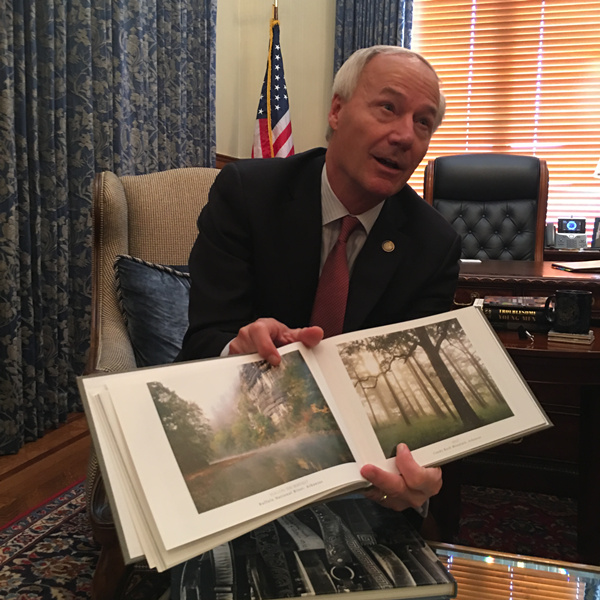 |
|
Governor Hutchinson shows a book of scenic photos of Arkansas. The state's nickname is "The Natural State". It was adopted by the legislature in 1995 to emphasize Arkansas' beautiful landscape and relatively untouched nature. The state has three national forests, five national parks and 52 state parks. Provided by the Governor's Office to China Daily. |
Why did you invite Chinese companies to get involved in Arkansas' rice growing and processing sectors?
In 2015, Arkansas farmers raised more than 4.5 billion pounds of rice – about as much rice as the other 49 states combined. While that sounds like a lot, the fact that China consumes about 80 percent of the world's rice means that there are tremendous growth opportunities for Chinese investors to get involved in rice production in Arkansas. The level of food safety in Arkansas' mills is extremely high.
What advantage does Arkansas have in exporting beef to China since Tyson Foods, one of the largest meat-processing companies in the US, is headquartered in the state?
The decision to lift a ban on imported American beef imposed almost 15 years ago is good news for Chinese consumers and Arkansas cattle ranchers. Arkansas-based Tyson Food's beef division processes approximately 125,000 head of cattle each week. The beef is processed into Tyson's eight beef-packing facilities around the country. Currently, Tyson has about one-fourth of the US share in the beef market.
What measures has your administration taken to create a better environment for the development of businesses, including foreign-invested businesses?
Arkansas' China Office in Shanghai has taken several steps to increase Chinese foreign direct investment in Arkansas. It has identified targeted industries, created promotional materials in Mandarin, presented at conferences, identified and visited with potential sister provinces, established cooperative relationships with government agencies and commercial associations, arranged press briefings and helped identify and qualify potential investment opportunities. We've also hosted six delegations from China over the past two years.
What do you see for the future of textile-industry investment and cooperation between Arkansas and China?
I would like to see a cluster of textile facilities in Arkansas, especially in our Delta Region. Ruyi's facility will have a tremendous economic impact on an area that has lagged behind in employment statistics. But, like many manufacturing operations, this facility is more high-tech than textile facilities of past generations. A textile cluster not only brings more manufacturing jobs to Arkansas, but it also increases the value of cotton used in the garments, aiding our agricultural communities as well.
What other sectors in Arkansas would you recommend to potential Chinese investors?
Arkansas has a long history of manufacturing and maintains one of the highest manufacturing employment levels in the South. Some other sectors that are thriving include food processing, plastics and injection molding, automotive parts and suppliers, processed metals, and logistics such as warehousing and distribution."
What specialties does Arkansas have to attract Chinese tourists? What measures will your administration take to promote Arkansas tourism in China?
Arkansas has several specialties that may be appealing to Chinese tourists. The state is world renowned for road cycling and mountain biking. Northwest Arkansas recently played host to the International Mountain Biking Association (IMBA) World Summit, attracting mountain bikers from around the world to some of the most breathtaking rides in the country.
In addition, visitors can enjoy nature along beautiful motorcycle routes, play some of the finest championship golf courses in the Southern United States, take in one of Arkansas' 2,340 lakes or relax and enjoy some one-of-a-kind spa experiences. The state is also home to outdoor adventures such as trap and skeet shooting, horseback riding, zip lines, diamond digs, and breathtaking kayaking and canoeing experiences.
Allowing others from around the world to experience the natural beauty and wonderful adventures in Arkansas is, certainly, a great priority in my work as governor. I have traveled often to Asia, and we will be visiting China for the third time in as many years in just a few weeks. And while these trips are traditionally regarded as economic development missions, I see tourism as tremendous contributor to our state's economy and always look for opportunities to invite the world to come and see for themselves.
What is the status of education and cultural exchanges between Arkansas and China? What do you see for future development of such cooperation?
The University of Arkansas, our state's flagship institution, hosts a faculty-led apparel merchandising and product development study tour in China every other year. The study tour is an intensive fifteen-day interdisciplinary apparel and business-focused study tour which includes visits to the cities of Hong Kong, Guangzhou, Panyu, Shenzhen, Beijing and Shanghai. Partnering with the Walton College of Business, the students mingle with apparel merchandising, product development and business organizations in multiple aspects of the apparel supply chain and retail industries.
The University of Central Arkansas (UCA) hosts Arkansas' Confucius Institute, established in 2007 with East China Normal University – one of the most prestigious universities in China. The mission is to strengthen ties between the state of Arkansas and China, to enhance the mutual understanding of each respective culture and to promote Chinese language and culture within the State of Arkansas. Twenty-five programs are targeting this effort, including "Teaching Chinese in Arkansas", cultural and language exchanges, a new Chinese language major at UCA, business translation and consultation services, seminars, as well as cultural performances, exhibitions and special events."
What have been the major developments in China (economic, technology, cultural or other fields) in the past five years?
China has the most developed network of high-speed rail in the world. I have taken trains in China many times and am amazed by the speed and efficiency. Regarding the economy, the rise of the middle class is one of the biggest stories of the past five years. China looks different and more advanced every time I visit, which seems to be due to lots of investment in response to the growing purchasing power of the middle class. In trade, Arkansas will benefit from the recent removal of trade barriers for beef and rice from America.
What has been your personal experience with this development?
I have been to China five times as a private citizen and as governor of Arkansas. I have been impressed with the growth of the Chinese economy and with the commitment of China to expand global market opportunities.
What do you expect for the next five years and beyond as China drafts its development blueprint for the next five years?
Many people expect that there will more investment by Chinese companies in the United States. I expect that to bring about an even greater understanding between our two countries. Also, I would expect even greater access to the Chinese market for American companies. In particular, many people expect an increase in private aircraft. This would benefit Arkansas since private aircraft are one of Arkansas' biggest exports to China.
Governor Hutchinson shows a book of scenic photos of Arkansas. The state's nickname is "The Natural State". It was adopted by the legislature in 1995 to emphasize Arkansas' beautiful landscape and relatively untouched nature. The state has three national forests, five national parks and 52 state parks. PROVIDED BY THE GOVERNOR'S OFFICE
Governor Asa Hutchinson shakes hands with Chairman Yafu Qiu of Shandong Ruyi Technology Group (Ruyi) on May 10, as the company announced that it will invest $410 million in the former Sanyo manufacturing facility in Forrest City. Ruyi, headquartered in Shandong province, China, will create up to 800 jobs at the facility, the largest single job-creation announcement in the history of Arkansas' Delta Region. The plant will spin Arkansas cotton into yarn for textile use. It is Ruyi's first facility to locate in North America. PROVIDED TO CHINA DAILY
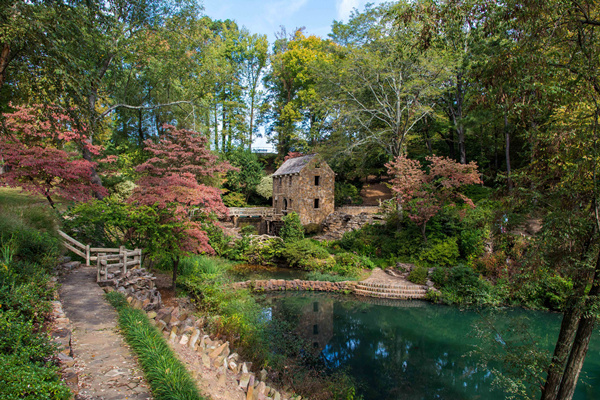
Arkansas Facts and Figures
Nickname: The Natural State (current), The Bear State (former)
Population: Approximately 3 million
GDP: $109.7 billion (2016)
Capital city: Little Rock
Area: 137,733 square kilometers
Major cities: Little Rock, Fayetteville-Springdale-Rogers-Bentonville Metropolitan Area
Fortune 500 firms: Seven Fortune 500 companies headquartered in Arkansas: Wal-Mart, Tyson Foods, Dillard's, J.B. Hunt Transport Services, Murphy Oil, Murphy USA, Windstream Holdings








